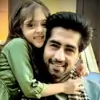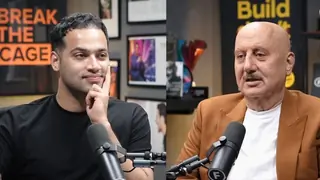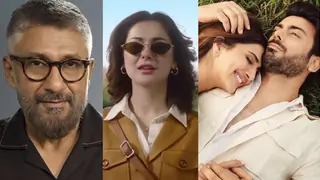The Soundtrack Coming to the score, I like the way the composer is going away from his trademark theme-lines and addictive hooks. I have been relishing the layered work that's been coming out from his stable, and I would consider Bose, Mangal Pandey, Swades and Jodha Akbar in this streak. And I am glad that the songs in this album are as long as one would want them, mature, complete pieces in their own.
Javed Akhtar refrains from using chaste Urdu and achieves a fine balance between the different sensibilities involved in the film, which is all the more applaudable considering the great taste our nation has got for controversies.
1. Azeem-O-Shaan Shahenshah - Mohd. Aslam, Bonny Chakravarti
This is one of the most visual track I have heard in recent times. The sound designed has to be heard on a good system to be believed, you will practically see a battle scene, the army being lined up, war cries in your living room. It feels as is few mad musicians and singers were let free in the recording studio and what came out is this mad track that goes from an aggressive war cry to a celebration of the grandeur, touching upon Mughal war cries in Urdu to a much dehati UP kinda paean genre. The song is a journey and will take many hearings to explore all the possible trips. For starters, try the Marhaba Marhaba trip or once just focus on the swords crashing and the non-musical sounds, or the one where you just focus on the percussion.
Or sample the pure rush when the chorus crescendos through the sargams and aalaaps to a climactic "Jalaluddin Akbar". You almost feel here is a larger than life monster out on a prowl. OK bad comparison, but bottomline:It's a mad mad world out there!
2. In Lamhon Ke Daaman Mein - Sonu Nigam, Madhushree
In Lamhon Ke Daaman Mein
Pakizah Se Rishte Hain
Koi Qalma Mohabbat Ka
Dohrate Farishtey Hain
A beautiful quartet, translates somewhat into this..
In the lap of these moments
Lie some lovely ties
Like a scripture(Qalmaa = the beginning of Quranic verses) or an ode to love
Which angels seems to be repeating endlessly
(Farishta= Angel, Apostle, Messenger, Prophet)
Khamosh Si Hai Zameen Hairaan Sa Falak Hai
Ek Noor Hi Noor Sa Ab Aasman Talak Hai
The earth is quiet
The sky is amazed
(Falak= Sky, Heaven, Fortune, Fate)
The skies are enveloped in a splendid hue/luster
(Noor= Bright, Light, Luminescence, Luster, Refulgence)
This song has three characters, one of a thoughtful lover(Raja), one the situations(represented by a dramatic chorus-Prajaa) and the third of a devoted female lover(Rani). And it's the bold interplay of these three that give a distinctive dramatic element to the song. It moves through seasons of love.
After the violent interludes of the chorus, the same serenity is regained and its as relaxing as it could get. The poetry and language is very intriguing here, while you hear the male singer croonings mild Urdu sonnets, the chorus is very Hindustani classical(Dom Tom Tana Nana Dom Tom Tana Dom Dom Tom Tana Nana Dom Tom Tana)
While still sticking to the Urdu flavor. What follows is absolutely shocking and stunning at the same time. The mood moves from 'Qalma' and 'Noor' to the devotional strains of a Sitar with Madhushree doing what she pretty much always does – adding saccharine to a song at a time when it needs the most.
Samay Ne Yeh Kya Kiya
Badal Di Hai Kaya
Tumhe Maine Paa Liye
Mujhe Tumne Paaya
Mile Dekho Aise Hain Hum
Ke Do Sur Ho Jaise Maddham
Koi Jyada Na Koi Kam
Kisi Raag Mein
Ke Prem Aag Mein
Jalte Dono Hi ke Tan Bhi Hain Man Bhi
Man Bhi Hai Tan Bhi
Tan Bhi Hai Man Bhi
Man Bhi Hai Tan Bhi
At this point, almost in a sawaal-jawaab format, the music comes to a stand-still and the male singer croons, rather almost speaks…
Mere Khwaabon Ke Is Gulistaan Mein
Tumse Hi To Bahaar Chhaai Hai
Phoolon Mein Rang Mere The Lekin
In Mein Khushboon Tumhi Se Aaye Hai
You cannot follow this with anything else but the violent chorus. And that's exactly what happens. This makes the song 'mukkamal', completes the circle.
Clearly, a stand out composition in its structure, treatment and execution.
3. Jashn-E-Bahaara - Javed Ali
This song comes in the league of soft Rahman tracks a la Ae Hairate Ashiquie(Guru), O ri Chhori(Lagaan), Saawariya(Swades) or Des ki Mitti(Bose). Since this category needs to have a distinctive element or two, it is Javed Ali's affluent abandon of a voice that does the trick along with a Persian string accompaniment.
Rahman has this knack of presenting the 'joy in pain(gham mein khushi)' genre in the most hummable form possible. Sample a 'Ae ajnabi' or a 'So gaye hain'(Zubeidaa), and that's exactly what he does here. What's rather funny is that everyone forgets the fact these are actually songs with an element of in them.
Kehne ko Jashn-e-bahaara hai
Ishq yeh dekh ke hairaan hai
(jashn=feast, celebration jubilation)
Jashn-e-bahaara would roughly translate to a celebration of beauty/elegance/spring.
'Kehne ko' is a significant operative here, it brings the poignant irony to the seemingly pleasing mood.
In between the visible festivities, there is an element of Ranj(Distress, Grief, Sorrow), beautifully expressed in these words…
Phool se khushboo khafa khafa hai gulshan mein
Chhupa hai koi ranj fiza ki chilman mein
The fragrance is shying away from the flowers
There is a hidden sorrow in the curtain of the happy air
(Fiza=atmosphere, environment, Chilman=curtain)
Saare sehmein nazaare hain
Soye soye waqt ke dhaare hain
Aur dil mein khoyi khoyi si baatein hain
The sorrow emotion gets more pronounced slowly.
Kaise kahein kya hai sitam
Sochte hain ab yeh hum
Koi kaise kahein woh hain ya nahi hamaare
Karte to hain saath safar
Faasle hain phir bhi magar
Jaise milte nahi kisi dariya ke do kinaare
Pass hain phir bhi paas nahi
Humko yeh gham raas nahi
Seeshe ki ek diwar hai jaise darmiyaan
Hum ne jo tha naghma suna
Dil ne tha usko chuna
Yeh dastaan hamein waqt ne kaisi sunaai
Hum jo agar hain gumgheen
Woh bhi udhar khush to nahi
Mulaquaato mein hai jaise ghul si gai tanhai
Milke bhi hum milte nahi
Khilke bhi gul khilte nahi
Aankhon mein hai baharein dil mein khiza
This song just might get most popular, but it is too early to predict that, considering there are 5 gems in the album. Chaar aur hote to Akbar ke Navratna poore ho jaate!
4. Khwaja Mere Khwaja - A.R.Rahman
How can a period drama's score be complete without the Ustaad himself wielding the microphone? So here you have him in all his glory.
In the string of higher pitch tracks like Zikr(Bose), Al Maddath Maula(Mangal Pandey), or Piya Hazi Ali(Fiza), here Rahman serenades the Almighty, a paean to Khwaja ji(saint "piir e mughaan/wali"). Listening to Rahman crooning a devotional number is like watching Tendulkar play in Wankhede(pardon the Siddhuism).
Slow guitar strums open the mystique melody, which slowly gets an obliging tabla's company and Rahman starts weaving magic, which is sure to have lasting aftertastes. His 'khwaja jee' thrown in equal measures almost pinches you that you are still here, its just a song.
5. Mann Mohana - Bela Shende
It would take one some time to come out of the heady web of Khwaja mere Khwaja to appreciate this simple bhajan, though its not a O Paalanhaare, it does have its moments. Mostly the way Bela's vocals start at a high octave and then sober down with some decent work from Akhtar which shies away from the stereotypes much like Bela's rendition does. This song should be a character-building aid for Jodha's character and should play out in installments. Trust Rahman to give you miles and miles of symphony in a bhajan!
Hope the film works the same magic!
Edited by Qwest - 17 years ago


















 .
. .
.













